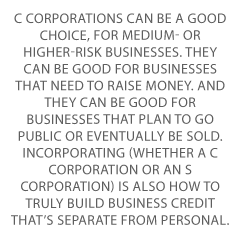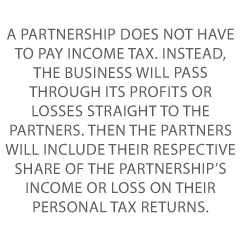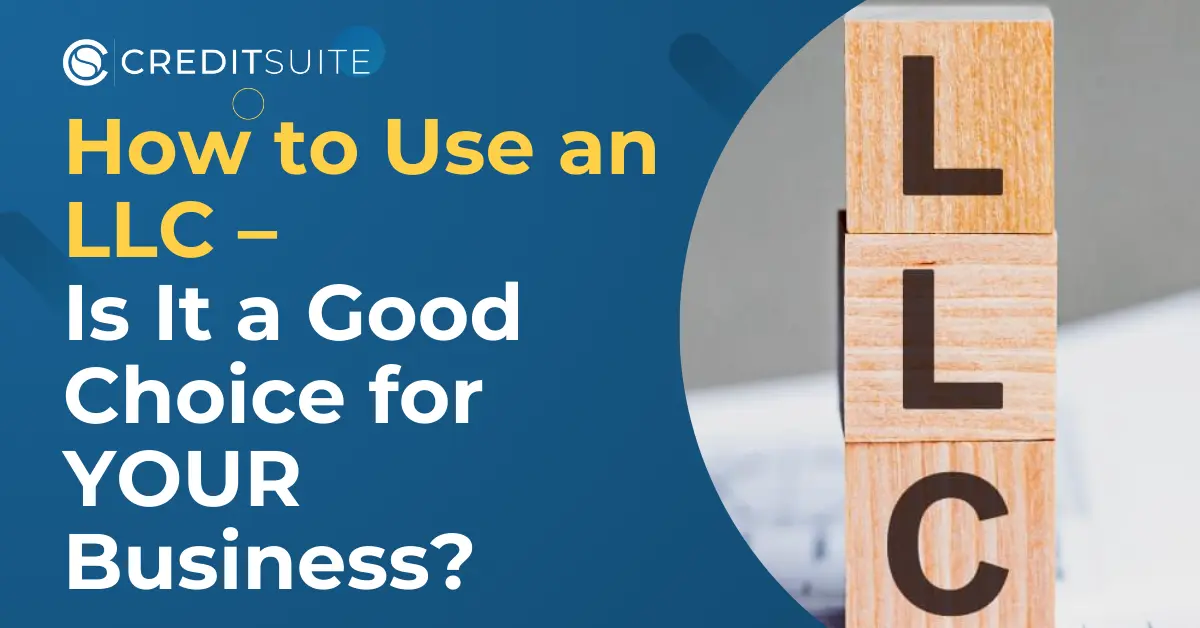How to Use an LLC for Setting Up a Business
One piece off setting up a business, beyond deciding on a name or buying web hosting, is deciding on the business entity. The business entity you choose will affect your business in numerous ways. If you want to know how to use an LLC, then you’ve got to know about business entities.
Why Business Entities Matter
Your business entity will determine the following with reference to your business:
- Taxes
- Legal liability
- Costs and shares
LLCs
LLC stands for “limited liability company”. According to Nolo.com:
“An LLC is one type of legal entity that can be formed to own and operate a business. LLCs are very popular because they provide the same limited liability as a corporation, but are easier and cheaper to form and run.”
It “is a popular business structure combining both the liability protection of a corporation and pass-through taxation of a partnership. One advantage of an LLC is the flexibility it offers in terms of management and ownership structure.”
LLCs vs. Corporations vs. Partnerships
In order to best review what an LLC is, and how it can be helpful to your business, it pays to explain what partnerships and corporations are, including where they converge and where they differ from LLCs. We’ll also look at sole proprietorships. Also read our article: Sole Proprietor vs LLC vs S Corp.
Business Entities and the IRS
The IRS recognizes these business entities:
- Sole proprietorship
- Partnership
- C-Corporation
- S-Corporation
But an LLC is not considered a separate entity by the IRS. As a result, the IRS will follow certain rules depending on the size of an LLC, when it comes to deciding whether to treat it more like a partnership, or a corporation, or a sole proprietorship.
Business Entity Definitions
Let’s look at what the various business entities are.
Sole Proprietors and Partnerships
Sole proprietors – per the SBA, this type of structure “can be a good choice for low-risk businesses and owners who want to test their business idea before forming a more formal business.”
There are Limited Partnerships and Limited Liability Partnerships. Limited partnerships have only one general partner with unlimited liability. All other partners have limited liability.
Limited Partnerships and Limited Liability Partnerships
With limited partnerships, partners with limited liability also tend to have limited control over the company. The general partner (the partner without limited liability) must pay self-employment taxes. Limited liability partnerships work a lot like limited partnerships. But they give limited liability to every owner.
An LLP protects each partner from debts against the partnership. Plus, partners will not be responsible for the actions of other partners.
C Corporations
C Corporations have a completely independent life separate from their shareholders. If a shareholder leaves the company or sells his or her shares, the C corporation can continue doing business relatively undisturbed. C corporations have an advantage when it comes to raising capital, because they can raise funds through the sale of stock. This can also be a benefit in attracting employees.
C corporations can be a good choice, for medium- or higher-risk businesses.
They can be good for businesses that need to raise money. And they can be good for businesses that plan to go public or eventually be sold. Incorporating (whether a C corporation or an S corporation) is also how to truly build business credit that’s separate from personal.
S Corporations
S Corporations are also called Subchapter S Corporations. An S Corporation is a special type of corporation. It is designed to avoid the double taxation drawback of regular C corps.
S corps allow profits, and some losses, to be passed through directly to owners’ personal income, without ever being subject to corporate tax rates. S corporations are subject to certain rules, such as they can only have 100 or fewer shareholders.
How to Use an LLC and Other Business Entities When it Comes to Legal Liability
Let’s take a look at how legal liability differs among various business entities.
Sole Proprietors
With a sole proprietorship, there are no limits to personal liability. As a result, if the sole proprietorship did it, then so did its one owner. This includes all debts and obligations, and any risks from the actions of employees.
Partnerships
In partnership situations, partners retain full, shared liability. Therefore, partners are not only liable for their own actions, but they are also liable for any business debts and decisions made by the other partners. In addition, all of the partners’ personal assets can be seized to satisfy a partnership’s debt.
Limited liability partnerships are an effort to address some of these downsides, like limiting a partner’s liability to just the money he or so put into the business.
C Corporations
Within a C corporation, shareholders’ personal assets get protection. Shareholders can usually just be held accountable for their investment in the stock of the company. But if an employee commits fraud or a felony under the corporation’s direction, then the corporate ‘veil’ can be ‘pierced’. If this happens, then personal assets can be on the line.
S Corporations and LLCs
An S corporation shareholder’s personal assets, like personal bank accounts, cannot be seized for the purpose of satisfying any business liabilities. Owners of an LLC are called ‘members’, as opposed to the owners of corporations, which are called ‘shareholders’. In an LLC, the LLC members get protection from personal liability for the business decisions or actions of the LLC.
If the LLC incurs debt or is sued, the members’ personal assets are often exempt. But not always, hence the term ‘limited liability’.
How to Use an LLC for Distributing Costs and Shares
How do the distributions of costs and shares differ?
Sole Proprietorships, Partnerships, and LLCs
In a sole proprietorship, the owner is the company. If it makes money, so does the owner (and their share is 100%). In partnership situations, partner shares vary, and they should be clearly spelled out in the partnership agreement. An LLC works as another type of corporation. The only real difference is liability rather than shares and costs, so it works like other corporations.
Corporations (Both Types)
A corporation is run by its board of directors. These are usually the owners. Ownership stakes are defined by what percentage of stock everyone owns. If one person has a controlling interest (over 50% of the stock), then their decisions will generally overrule everyone else’s.
If the shareholders have smaller stakes in the corporation, sometimes shareholders will band together to influence decisions or even kick out board members. Profits are generally distributed per share percentages.
But board members can take a salary. In an S Corporation, a shareholder working for the company must pay him or herself reasonable compensation. The shareholder has to get fair market value. Otherwise, the IRS may reclassify any additional corporate earnings as wages.
Taxes
How does taxation differ?
Sole Proprietors and Partnerships
 Sole proprietors are the same as their owners, the owner pays taxes on the sole proprietorship’s profits. A partnership does not have to pay income tax.
Sole proprietors are the same as their owners, the owner pays taxes on the sole proprietorship’s profits. A partnership does not have to pay income tax.
Instead, the business will pass through its profits or losses straight to the partners. Then the partners will include their respective share of the partnership’s income or loss on their personal tax returns.
C Corporations
C Corporations pay state and federal taxes, they sometimes also pay local taxes. This will include paying income taxes on profits. It is the opposite of partnerships and sole proprietorships.
A corporation can end up paying taxes twice, first when it makes a profit, and the second time when dividends go to the shareholders. This is the case even if there is just one shareholder
S Corporations
Only the wages of any S corporation shareholder who is also an employee are subject to employment tax. Any remaining income is payment to the owner as a distribution. Distributions are taxed at a lower rate, if at all.
Per the IRS, “Generally, an S corporation is exempt from federal income tax other than tax on certain capital gains and passive income. It is treated in the same way as a partnership, in that generally taxes are not paid at the corporate level.”
How to Use an LLC When it Comes to Taxes
An LLC is not a separate entity as per the Internal Revenue Service. As a result, it is not taxed directly. Instead, the members pay individual taxes. Members of an LLC have to pay an employment tax on the entire net income of the business.
Upsides for How to Use an LLC
LLC members get protection from personal liability for the LLC’s business decisions or actions. If the LLC incurs debt or someone sues it, member personal assets are often exempt.
LLCs don’t pay the double taxation of standard corporations, and if they ‘pass through’ profits to member tax returns, LLC owners may be able to deduct 20% of their business income with the 20% pass-through deduction established under the Tax Cuts and Jobs Act of 2017.
Downsides for How to Use an LLC
The IRS (and others) doe not see an LLC as a separate entity, hence it’s not good for fully separating business from personal credit. LLC members end up paying employment taxes on the entire net income of the business. LLCs can’t issue shares so they can’t use the issuance of shares as a form of fundraising.
Annual/biennial renewal fees are often higher than for corporations. Setup fees (as of 2023) run from $35 (Montana) and $40 (Kentucky) to $500 (Massachusetts). And annual/biennial renewal fees run from $0 (Arizona, Idaho, Minnesota, Mississippi, Missouri, New Mexico, Ohio, South Carolina, and Texas), to $800 (California, annually + $20 every other year).
Why and How to Use an LLC – is it Right for Your Business? Takeaways
If you want to build credit for your business, an LLC will not offer you the protection that a C corporation or an S corporation does. But an LLC is better than a partnership or a sole proprietorship, when it comes to personal liability.
If you want to (potentially) save on taxes, then an LLC might be a good idea. But if your business truly takes off, your personal taxes will be higher, even with a 20% deduction.

